|
|
|
LPG Terminal inaugurated in Gwadar-Alpine handled the first arrived vessel
Gwadar’s first LPG (liquefied petroleum gas) Terminal was inaugurated on Jan 7, marking the beginning of a new era of economic development in Balochistan. The terminal was inaugurated by Chinese Counsel General in Karachi Li Bijian. It started the operations with the arrival of LPG carrier Gas Esco, carrying 3,900 metric tons of LPG from Sohar, Oman.“Today a new era of economic development has commenced from Balochistan’s port city Gwadar as International LPG trade starts,” Li said, while addressing the inauguration ceremony. The terminal would spur economic activities in Gwadar which would benefit the local population through creation of more jobs. Alpine Marine Services, as port agent, handled the first LPG vessel that arrived at Gwadar Port.
|
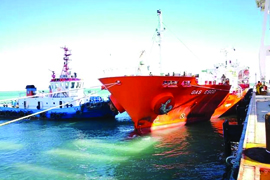 |
|
 |
Eco-friendly Pakistani textile attracts global buyers
The initiatives taken by Pakistan’s textile industry for environmental protection are being appreciated around the world. At the Heimtextil 2020, the largest global exhibition of home textile products, held in Frankfurt from January 7-10, buyers from the US and Europe, especially the large retail chains, expressed keen interest in Pakistan’s eco-friendly textile products. During the exhibition, the textile industry of Pakistan was cited as an example of protecting the environment. Speaking on the sidelines of the inaugural press conference, Head of the United Nations Office for Cooperation Lucie Brigham praised the initiatives of Pakistan’s textile industry, particularly the denim manufacturers, for turning their processes more environment-friendly. She stressed that the textile industry played a vital role in achieving the Sustainable Development Goals (SDGs) set by the United Nations.
|
|
|
Pakistan's ‘exports to rise substantially’ as Sino-Pak free trade pact phase-II
goes live
Phase two of the much-touted China-Pakistan Free Trade Agreement came into effect as of Jan 01, 2020, said a trade official. The new phase will allow Pakistani manufacturers and traders to export around 313 new products to the Chinese market with zero duties. The implementation of the agreement’s second phase, would make 90% of China’s global imports duty-free for Pakistan. Beijing earlier approved premature activation of the second phase of the pact with Islamabad, signed during Prime Minister Imran Khan’s visit to China last April. Pakistan is already enjoying zero duties on exports of 724 products to China under the first free trade pact signed between the two countries in 2006. After implementation of the second pact, Pakistan has been allowed to export more than 1,000 products to China with zero duties. The new facility will particularly benefit the agriculture, leather, confectionery items, and biscuits product sectors as well.
|
 |
|
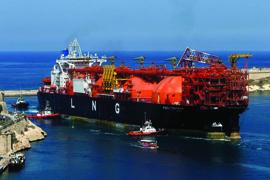 |
After 2025: Power producers reluctant to buy Qatar gas
High prices of liquefied natural gas (LNG) imported from Qatar have started impacting power producers who are not willing to purchase gas beyond 2025 – a time when Islamabad and Doha will hold a price review. Power producers are reluctant to sign a deal with suppliers of imported gas to guarantee fuel offtake beyond 2025. Power producers feel that re-gasified LNG-based power plants are not economical to run because of high gas prices and they do not fall within top categories in the merit order. LNG-based power plants remain shut most of the time, for this reason. However, consumers are bound to pay capacity charges to the power plants if they are not operated at full capacity. LNG terminal operators also receive capacity charges if they are not run at maximum capacity due to low offtake by the power producers.
|
|
|
Goods transport strike ended after giving loss of billions
The government has decided to resume the implementation of axle load law following a loss of Rs144 billion on account of halt to imports and exports in the wake of a goods transporters’ strike. Container transport associations announced an end to the strike as it entered its eighth day. Karachi Goods Carriers Association General Secretary, while talking to news men said “Authorities have accepted our 10-point agenda, hence, we ended the strike,” In those 10 points, the biggest demand of the transporters was the implementation of axle load law, he said. The law was enacted in 2002 and its implementation began in 2014, however, the government backtracked when the industry pressurised it last year, the general secretary added. In the past week around 1,400 containers carrying kinnows, potatoes and onions had not been able to reach the ports for their shipment abroad. The strike severely affected commercial activities within the country as containers arriving from other countries were piling up at ports. Delivery of imported raw materials to factories was also affected, slowing down production.
|
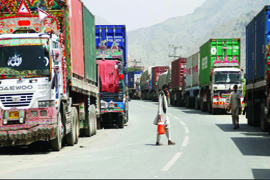 |
|
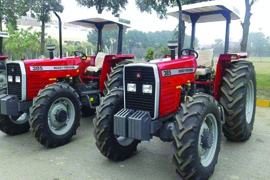 |
Tractor sales plunge 40pc
Owing to persistent depressed demand the tractor sales plunged to 15,200 units during the first half year of 2019-20 from 38,000 units in the same period last year. In recent years the tractor manufacturers have been facing sharp decline in demand mainly due to poor performance of the agriculture sector especially failure of cotton and some other cash crops. The country’s total tractor sales had fallen to 50,405 units in FY19 from 70,887 units in the preceding year. Other factors that are contributing to the massive downturn including the current economic situation, falling farm yield, crop prices, inflation and high borrowing rates. Given this situation vendors of tractor assemblers are definitely going to be hit hard, probably some of those would be forced to close their business. According to tractor industries people, in a situation where the industry’s profitability has shrunk visibly coupled with depressed affordability of the farmers (end users), the government in July 2019 introduced an additional sales tax and enhanced customs duty on the imports of CKD components being imported by auto manufacturers including tractor assemblers.
|
|
|
Sugar millers stop buying from farmers, close mills
The influential sugar millers have joined hands and closed their production units in an apparent attempt to push down prices of sugarcane, which have gone above the support price. Some members of the cabinet, in a recent meeting chaired by Prime Minister Imran Khan, raised the issue and voiced concern over the suspension of sugarcane purchase by the sugar mills, causing difficulties for the farmers. It was pointed out in the meeting that most members of the Pakistan Sugar Mills Association had colluded in order to close their mills as the sugarcane purchase price jumped to Rs225 per 40 kg compared to the official support price of Rs190 per 40 kg. Cabinet members were of the view that continued exploitation of the farmers by the powerful sugar mill owners was due to the pricing policy for sugarcane compared to the cotton crop, which did not have a support price. As a result, there was a constant increase in the cultivation of water-intensive sugarcane crop in the cotton-growing areas. The problems of farmers switching from cotton to sugarcane plantation had been compounded by the customs duty structure, which provided substantive protection to the sugar producers against imports whereas a marginal import duty on cotton affected cotton prices in the country in the face of cheaper imports.
|
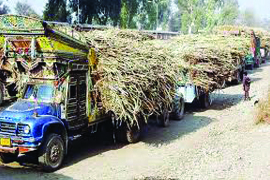 |
|
 |
PTA permit two companies to test 5G
Pakistan Telecommunication Authority (PTA) has permitted two cellular mobile companies to test 5G technology in some areas of Islamabad following their successful in-house trials. “PTA has granted permission to PMCL (Jazz) and CMPak (Zong) for six months to conduct test and trial of 5G technology under limited environment,” read a notice issued by the telecom authority. “The permission is limited to testing purpose only on non-commercial basis.” In June 2019, PTA issued a framework for testing and development of future technologies, particularly fifth generation (5G) wireless networks, in Pakistan in a bid to facilitate testing of 5G technology and related services in Pakistan. At that time, it was a one-time permission, however, now it has given the two companies a time period of six months to test 5G technology in a relatively wider area in Islamabad. Previous trials of both the companies were in-house tests. While giving the permission for tests on non-commercial basis only, PTA said it always supported and encouraged introduction of new technologies and enhanced services. “However, any impression given beyond the stated purpose by any cellular mobile operator (CMO) would be considered misleading and may trigger appropriate regulatory action,” it stressed. Commercial launch of 5G services in Pakistan would take place in due course following a process involving policy directions by the government coupled with necessary regulatory approvals.
|
|
|
PARC to introduce about 200 national brands in local market
Pakistan Agriculture Research Council (PARC) will introduce about 200 national brands of different food products in the local market to promote value addition in agricultural products as well as reduce domestic reliance on imported foodstuff, according to Director General PARC this initiative would also ensure provision of cost effective edible products to the common man in the country. “The initiative is also aimed at reducing poverty in the rural areas of the country by enhancing farm income through value addition in agricultural products that are being produced in these areas, and create maximum employment opportunities to overcome rapid urbanisation issues,” he said. He added that his organisation, in collaboration with the private sector, embarked upon a holistic plan to transform conventional agriculture into value added agriculture to reduce the import bill of food items in the country. Terming it a major cause for the deepening trade deficit. “The other objective of the initiative is to encourage a massive chunk of educated and semi-skilled youth to work in the agriculture sector by providing them with basic training and facilities for value addition in this segment to start their own business,” he added.
|
 |
|
 |
FBR claims loss of Rs330b due to import compression
Amid criticism over missing the revenue collection target by a wide margin, the Federal Board of Revenue (FBR) has claimed that it sustained losses of roughly Rs330 billion due to $6 billion worth of import compression in first half of the current fiscal year. The tax shortfall due to import compression and low economic activity has also led to the missing of the indicative first-half tax collection target of Rs2.198 trillion, agreed with the International Monetary Fund (IMF). It is for the second time in a row that the FBR has missed the first-half indicative tax collection target, this time by a margin of Rs115 billion. But the government has again managed to achieve the primary budget target for the first half that has again remained in surplus due to one-off non-tax payments and slow development spending.
|
|
|
Efficiency standards for lighting products to be enforced from 15th
The government has decided to introduce efficiency standards for all lighting products and equipment on Jan 15 as part of an aggressive energy conservation plan for all sectors of economy to reduce energy costs to consumers and be competitive in the market. The minimum energy standards for lighting would come into force on Jan15, for motors in February and then for refrigerators and air-conditioners within the next six months. The NEECA is a federal agency on energy conservation with representation from the provincial governments, the federal ministry of energy and the regulatory authorities to initiate and coordinate all energy conservation activities in various sectors of economy. It was established under the NEECA Act 2016 to enforce necessary measures for efficient energy standards and providing guidelines to provinces and industries. The agency had developed energy performance standards for almost every sector of economy in collaboration with the provinces and the regulatory bodies, including those in the petroleum, electricity, housing, transport, agriculture and textile sectors. According to an assessment of the Asian Development Bank, could provide 10-15 per cent of savings to national economy and reduce about three million tons of oil equipment (MTOE) within 2-3 years against the country’s total primary energy supply of about 88 MTOE per annum.
|
 |
|
|

© 2020 Alpine Marine Services Pvt Ltd.,
All rights reserved
|
|